Raising ducks has a lot of benefits and is easy, so consider the idea if you have the time and space for them. However, many factors are worth considering before you start or continue your duck-raising journey. For example, predators can attack your ducks.
Preventing predators from attacking your ducks is a primary concern, especially if your duck coop had been attacked before, or if you are planning to raise ducks. How do you keep your ducks safe from predators? Read this article to find out.
Some tips to help keep your ducks safe from predators are fencing your yard, removing predator attractants, staying vigilant, and employing guard animals.
What are some common predators that attack ducks? How do they get access to your ducks and how can you prevent this from happening? Continue reading.
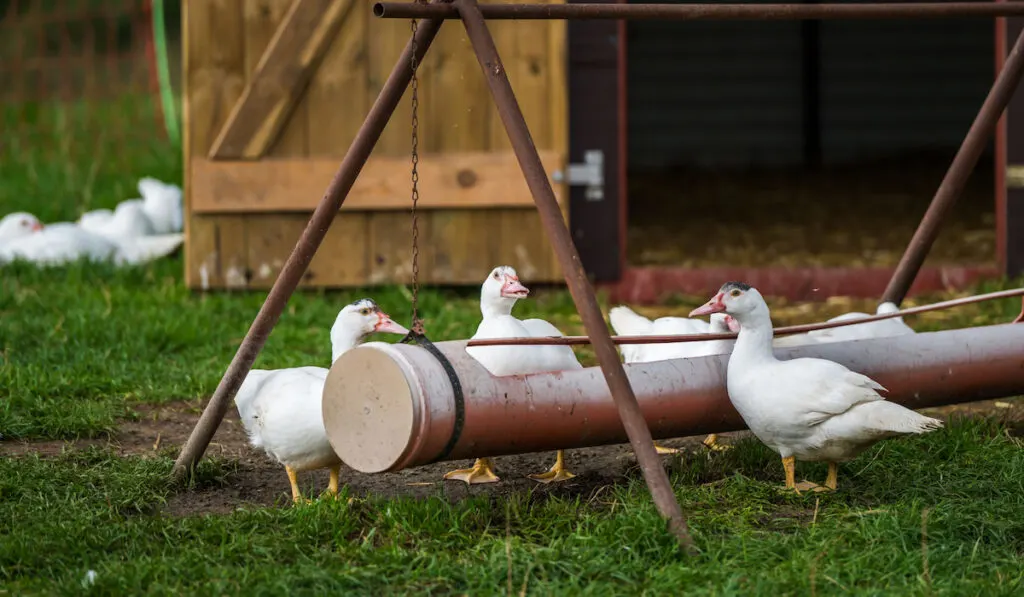
Table of Contents
9 Tips to Prevent Predators From Attacking Your Ducks
1. Keep the Coop at the Right Location
The first thing to do is to select a good location to build or relocate your duck coop. If the coop is too close to the fence or constructed along the line of the fence, predators can easily reach your ducks.
Keep your duck coop somewhere close to the middle of your enclosure, especially if you have seen predators attacking your ducks before.
The farther the coop is away from the edges of your yard, the more discouraged predators will be from attacking the ducks.
Another great idea is to keep the coop close to flowers or other scented crops in your yard. Predators that rely on their noses to locate prey will not easily find your ducks.
2. Fence the Coop
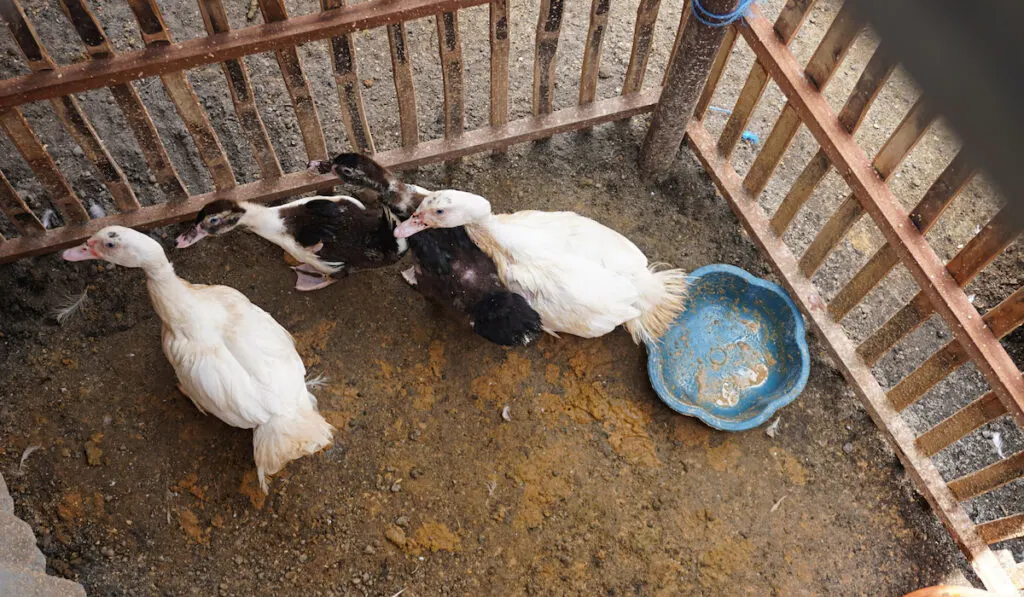
Of course, fencing the coop is something to think of even if there are no predators in your yard.
Fencing not only prevents many types of predators from reaching your ducks, but it also prevents ducks from going outside the yard where it is not safe.
You can use any type of fence. However, you can save costs by using fences made of nets or wire mesh. Ensure that the fence surrounds the entire yard or at least the edges of your yard with a lot of bushes and trees.
When fencing the yard, consider installing the fence 4-6 inches into the soil. This will prevent predators that burrow from entering your yard.
3. Use Motion-Sensor Alarms or Lights
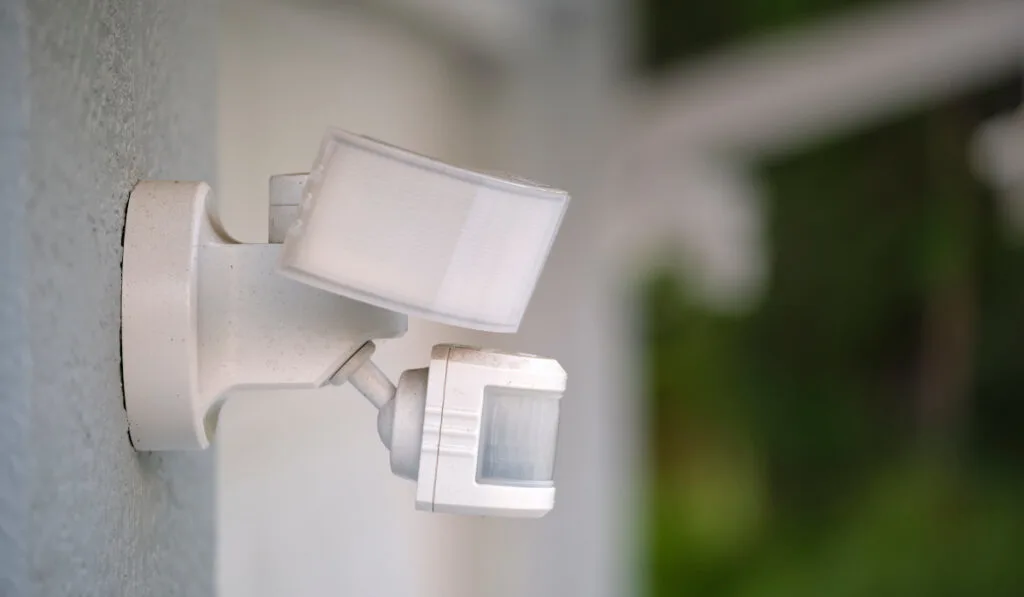
Motion-sensor alarms or lights are gadgets that help repel predators from your yard at night. They can also alert you of the presence of predators in your yard.
Install motion sensing gadgets close to the fence so that they can be triggered by predators trying to enter the yard.
Do not install the sensors too close to the coop of your ducks because your ducks (and other farm animals) can also trigger the sensors.
4. Keep the Coop and Yard Clean
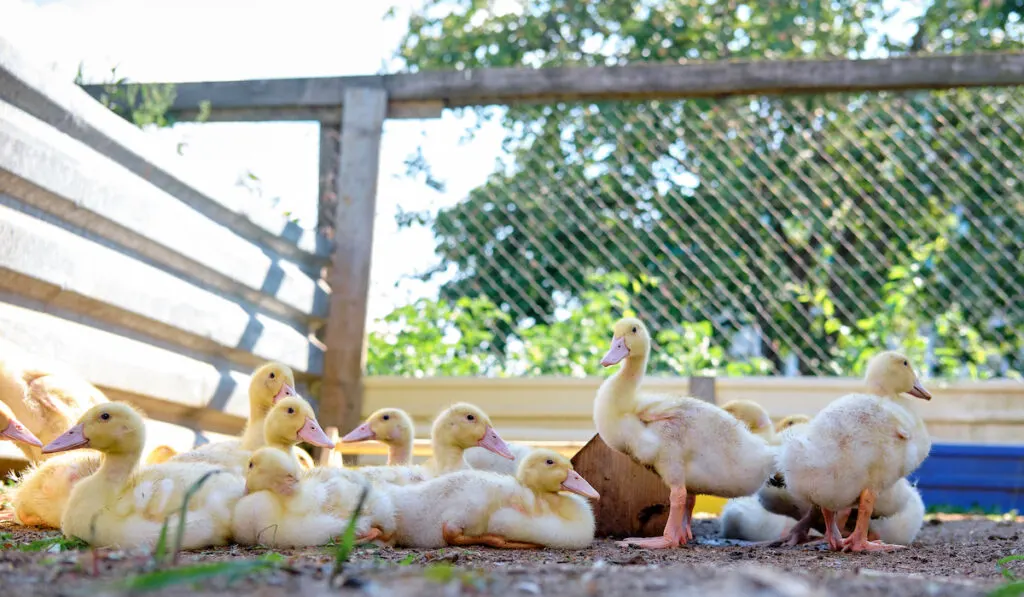
Some omnivores may enter your yard because they are looking for food waste in the yard. When they see ducks (which are more desirable than food waste), they will opt for the ducks.
To prevent omnivores such as raccoons from entering your yard, clean the yard regularly.
Some predators such as snakes follow rats into the yard. Rats enter your yard because of food waste in your yard.
As you can see, removing food waste and other organic products from your yard can help prevent predators from entering the yard.
5. Provide Hiding Places Outside the Coop
When your ducks as outside, they do not need to run back to the coop when they see a predator in the yard. All they need to do is run to a secure spot.
For example, ducks hiding under the canopy of trees can be kept safe from predatory birds by such a canopy. This means that aside from the duck coop, your ducks need other structures (even if temporary) to run to in case they see predators.
6. Limit the Outdoor Activities of Your Ducks
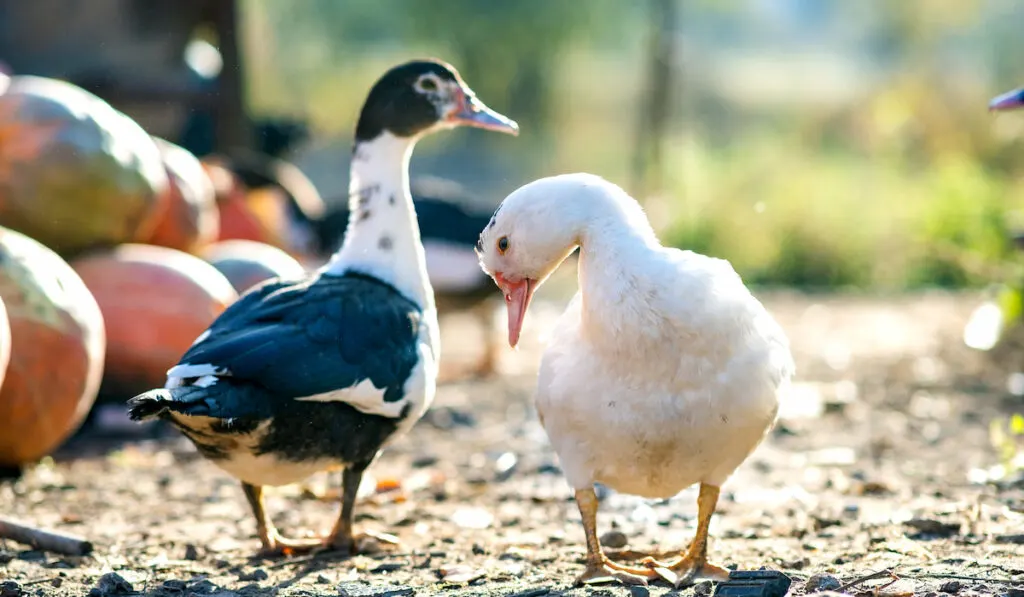
If it is fox season or a particular predator species has become rampant in your area, the best thing to do is to limit how often your ducks go outside. Whenever the ducks go outside, keep an eye on them.
Do not allow the ducks to go out at night, as many duck predators are nocturnal.
While you keep your ducks inside, make sure that they are comfortable. If your ducks do not find food, water, and other types of comfort inside their coop, they may want to go out.
7. Monitor Your Foraging Ducks
Even if there are predators in your area, do not prevent your ducks from searching for food in the yard. Foraging ducks are hardier, happier, and grow faster, as they get more food when compared to ducks locked in the coop.
However, always monitor your ducks, especially when they are outside. Predators usually notice the presence of ducks in your yard when the ducks are outside, so keep an eye on the ducks when they are outside.
Pay attention mostly to mother ducks, as avian predators attack ducklings the most.
8. Consider Using Guard Animals
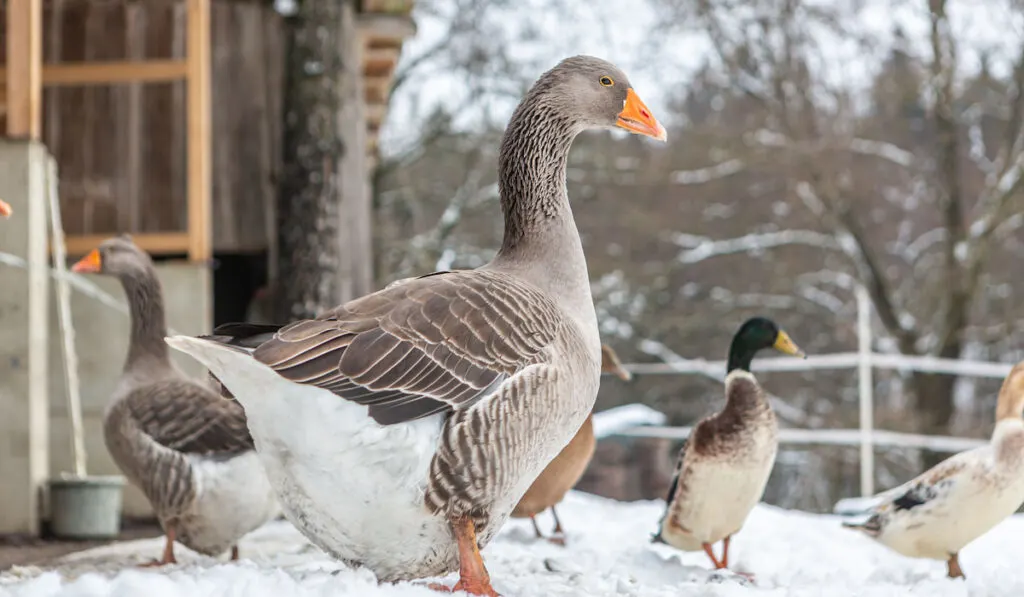
Why guard your ducks by yourself when you can employ a pet to do it for you, free of charge?
Buying a guard dog will save you a lot of ducks, as dogs will fight off predators and even alert you of their presence.
If you do not want dogs in the same yard with your ducks, consider raising geese. Geese are very territorial and will alert you when unknown animals enter your yard. They might also attempt to fight off the predators.
9. Stay Vigilant
No matter what, continue watching over your ducks and other animals in your yard. Even if there is a fence in the yard and you have installed some other predator-prevention products, continue staying vigilant.
What Can You Do After Predators Attack Your Ducks?
While it’s a great idea to know how to care for your ducks after a predator attack, remember that prevention is better than cure. Therefore, give more priority to the tips above than those below.
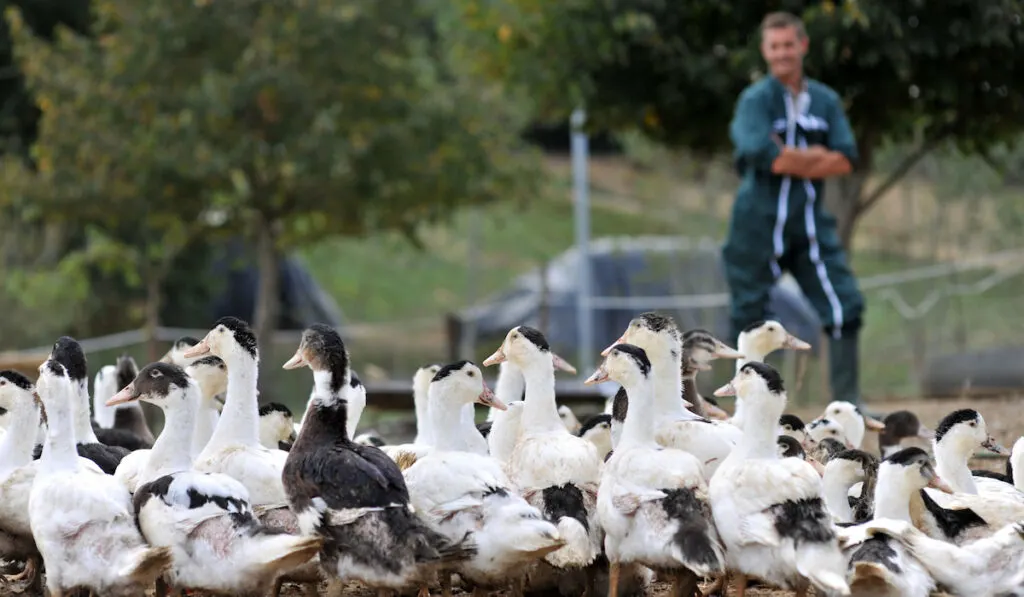
1. Regularly Check on Your Ducks
First of all, count your ducks so that you can always check if some are missing. If you are sure that predators attacked your ducks, count them to know how many went missing.
Aside from checking your ducks to know how many are remaining, also study the behavior of your ducks.
If they look hurt or are sick, inform a vet immediately. Also, identify the hurt ones and isolate them from the others if you have extra space.
2. Quickly Treat Your Injured Ducks
Are there any badly injured ducks? Treat them quickly so that they do not get infections or disease from their injury. It’s also a great idea to isolate the duck so that it does not spread any disease to others.
The vet will most likely ask you what type of predator attacked your ducks so that they can recommend the best type of drug or antibiotic.
Please tell them the exact predator or show them some signs of the predator’s attack on your ducks.
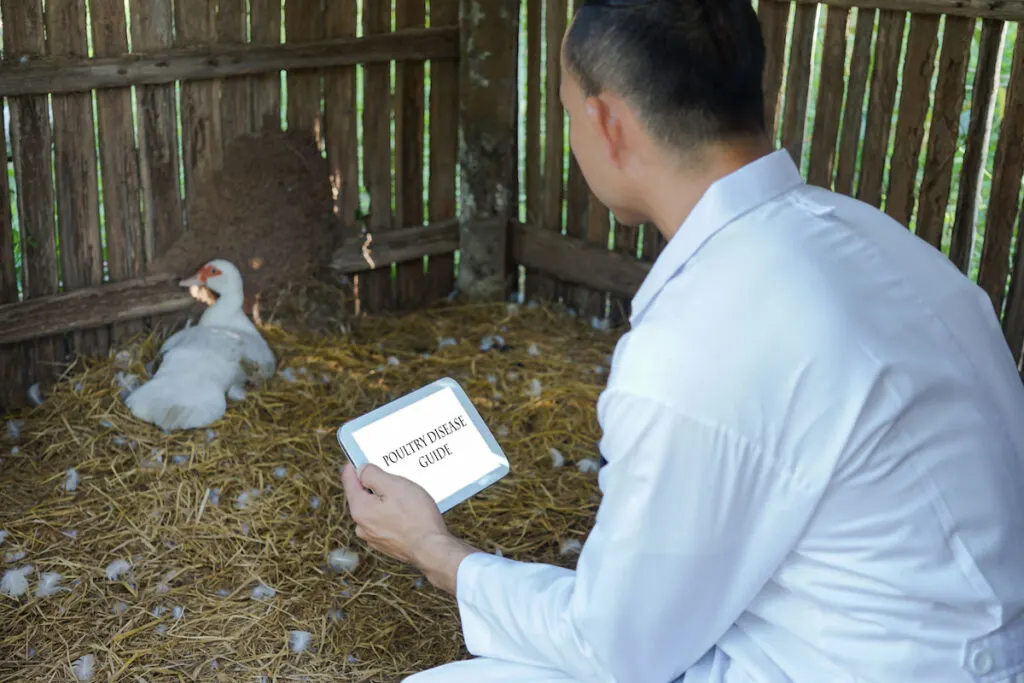
3. Report Rampant Predator Attacks to Local Authorities
Depending on where you live, you can report predator attacks to local authorities. This is important so that you do not have to deal with duck predators alone. Also, the local authorities can give you useful tips that will surely work.
If a new type of predator attacks your ducks or you cannot identify the animal, tell others so that they can help you.
If possible, collect photos of the injured ducks and other signs left by the predator. Share the photos online, especially on forums dedicated to ducks and poultry.
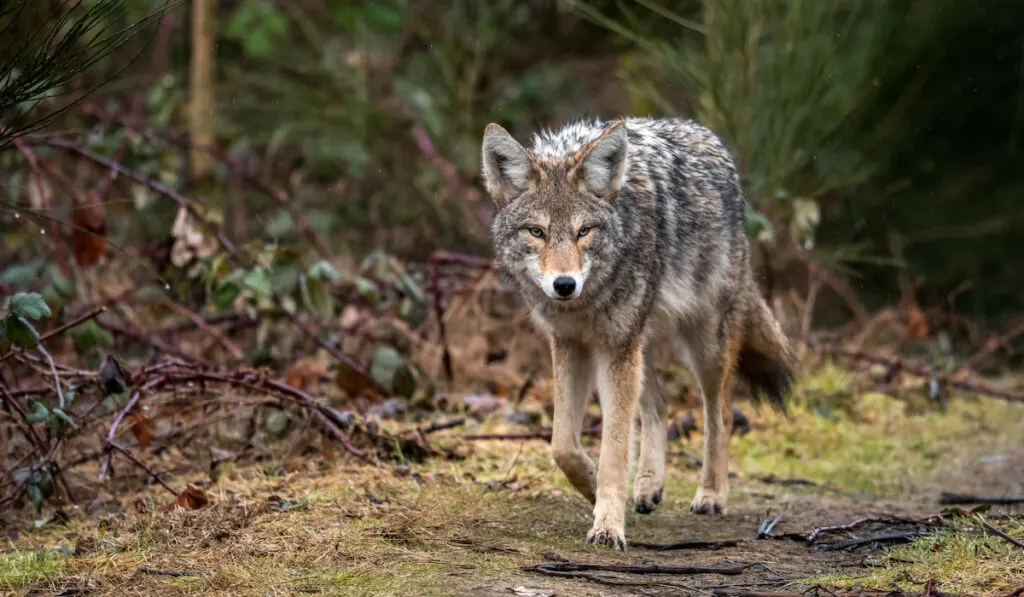
Related Questions and Answers
1. What Are Some Common Predators of Ducks?
Some common animals that can attack your ducks are:
- Foxes
- Raccoons
- Coyotes
- Hawks
- Bobcats
- Minks
- Owls
- Snakes
The main predator of your ducks depends on where you live, as not every predator is found everywhere.
2. How Do Predators Have Access to Duck Coops?
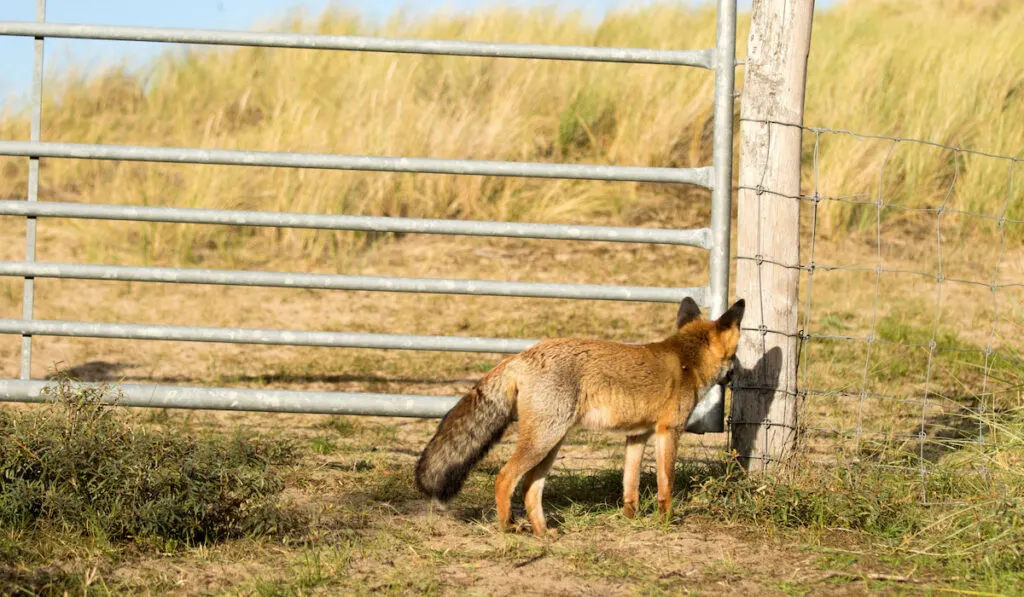
Predators have access to duck coop through the following methods:
- They come from above the coop: Hawks and owls are some duck predators that fly above the coop, target their prey, and strike.
- They burrow their way into your yard: Minks and some other predators can borrow into your yard. In this case, you’d see holes in your yard, especially near the fence.
- They squeeze into open spaces in the fence: Whenever there’s a hole in the fence or net, nearly every mammalian predator will enter your yard through it. Regularly check the fence for holes.
- They attack at night when you are not watching: Nocturnal predators such as owls, bobcats, and raccoons will attack your ducks at night. They know that you are not watching them.
3. How Can You Tell That Your Ducks Were Attacked by Predators?
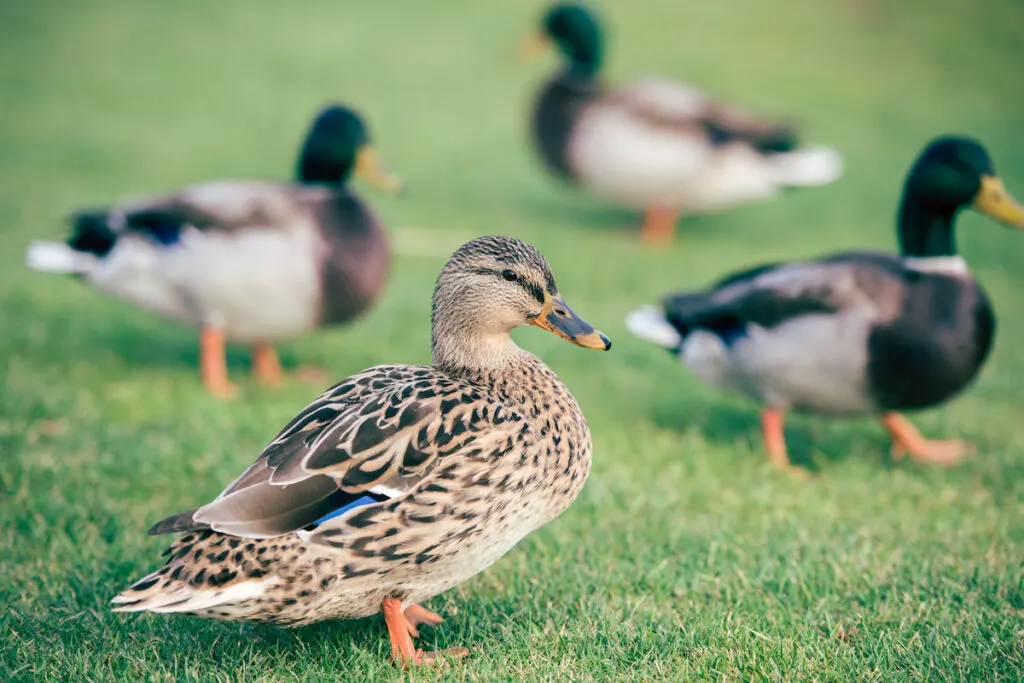
Some ways to tell that your ducks were attacked by predators are:
- Seeing the predators: This is the most reliable way, as you can see the predators by yourself. Now, you know the exact predator of your ducks.
- The noise of your ducks: When ducks are not comfortable, they make very loud quacks. If your ducks are quacking at odd hours or for no obvious reason, check for predators.
- Missing ducks: How many ducks do you have? How many can you count now? If a duck is missing, search for it but also keep in mind that it might have been stolen by predators.
- Badly injured ducks: If your ducks are not sick but are badly injured, you can tell that a predator attacked them.
Final Thoughts
Now, you can keep your ducks safe from predators. Remember to give more priority to keeping your ducks safe from predators than treating the ducks after a predator attack. Also, stay vigilant and keep every unwanted animal far from your yard.
Resources
- https://www.thehappychickencoop.com/top-7-duck-predators-how-to-know-which-and-prevention/
- https://www.thehappychickencoop.com/protecting-free-range-ducks-from-predators/
- https://www.tyrantfarms.com/17-tips-to-keep-your-ducks-and-chickens-safe-from-predators/
- https://birdsandwetlands.com/how-to-protect-ducks-from-hawks/
